This article was co-authored by Roy Nattiv, MD. Dr. Roy Nattiv is a Board-Certified Pediatric Gastroenterologist in Los Angeles, California. With over 20 years of experience he specializes in a broad range of pediatric gastrointestinal and nutritional illnesses such as constipation, diarrhea, reflux, food allergies, poor weight gain, SIBO, IBD, and IBS. He completed his pediatric residency at the Children’s Hospital at Montefiore, Albert Einstein College of Medicine in New York, and his fellowship at the University of California, San Francisco (UCSF). While at UCSF, he was a California Institute of Regenerative Medicine (CIRM) fellowship trainee and was awarded the North American Society for Pediatric Gastroenterology, Hepatology, and Nutrition (NASPGHAN) Fellow to Faculty Award in Pediatric IBD Research. Dr. Nattiv received his undergrad degree from the University of California, Berkeley, and his medical degree (MD) from the Sackler School of Medicine in Tel Aviv, Israel.
There are 13 references cited in this article, which can be found at the bottom of the page.
This article has been viewed 35,801 times.
Gastroesophageal reflux disease (GERD) is a chronic digestive disease. GERD occurs when stomach acid or, occasionally, stomach content, flows back into your esophagus because your lower esophageal sphincter (LES) is not closing as it should. The backwash (reflux) irritates the lining of your esophagus and causes GERD. Both acid reflux and heartburn are common digestive conditions that many people experience from time to time. When these signs and symptoms occur at least twice each week or interfere with your daily life, you may have GERD.
Steps
Choosing Foods Carefully
-
1Avoid fatty and spicy foods. These are the kinds of foods that will typically trigger heartburn and acid reflux.[1] In small amounts you might be able to continue eating them for a treat, but as a regular part of your diet, you need to cut them out.[2]
- Fried foods, particularly deep fried
- Foods with lots of chiles or hot peppers
- Creamy, buttery, or dairy-heavy foods
-
2Stay away from alcohol and caffeine. Neither substance is easy for your body to process.[3] They also tend to dry out your mouth, which is bad for saliva production. Saliva helps your body break down and process your food.[4]
- You can have a drink of alcohol or coffee occasionally, but keep track of how you feel afterward -- if it exacerbates your symptoms you should probably try to never drink either.
Advertisement -
3Steer clear of acidic foods. Acid reflux and heartburn can both be exacerbated by acid in your diet.[5] Unfortunately, they are common in many diets. Some of the common acidic foods to avoid are:[6]
- Citrus fruits
- Tomatoes
- Cocoa products (chocolate-based)
- Strawberries, although not super acidic, also exacerbate GERD symptoms.
-
4Choose healthy foods. A varied diet of fruits and vegetables, whole grains, and lean meats will help keep GERD at bay. Check the website below for help planning healthy meals.[7] Some good choices include:
- Berries
- Apples
- Leafy greens
- Cruciferous vegetables like broccoli, cauliflower
- Whole grains like oatmeal, farro, quinoa, wild rice
- Lean meats like loin cuts and poultry
- Fish
-
5Eat smaller meals more frequently.[8] Your body will be better able to process smaller amounts of food. With the smaller amounts, it’s less likely that your body will respond with GERD symptoms. Staying full means that you will probably need five to six small meals per day, rather than three large ones.
- Drink small amounts of water with each meal.
-
6Wait at least three hours after eating before lying down.[9] You need to be upright for your body to properly process food, and it takes a while. Going to bed or laying down soon after eating is a very common cause of heartburn, as acidic stomach contents move back up into your esophagus. Stay upright for three hours after every meal or snack to prevent this.[10]
- Also avoid bending over and lifting heavy objects after a meal, as the strain can also trigger GERD symptoms.
- If you absolutely need to rest, raise your head up on the bed so that you’re not completely horizontal. You might also consider sleeping with your head slightly raised to help digestion.
Making Lifestyle Changes
-
1Avoid smoking. As with alcohol and caffeine, tobacco dries out your mouth.[11] Without enough saliva, it’s easier for your body to produce the symptoms of acid reflux or heartburn. It’s also important to reduce your intake of secondhand smoke, which will produce the same issues. Tobacco also decreases the lower esophageal sphincter's ability to function properly.[12]
-
2Wear loose-fitting clothing. Sometimes constricting clothes around your stomach can exacerbate GERD symptoms. Tight clothing can force the contents of your stomach up your throat, creating acid reflux.
- Avoid belts
- Try elastic-waist pants rather than jeans
-
3Lose weight if you’re overweight. GERD symptoms can be reduced or eliminated if you lose weight.[13] Avoiding fatty foods, for example, can both help you lose weight and stop heartburn and acid reflux. Exercise can also both help your body process food and help you lose weight.[14]
- Keep track of the calories you consume. If you want to lose weight, decrease the number of calories in your diet.
- Start an exercise program. Exercise is an important complement to eating less and losing weight.
- Drink water before you eat -- it can help fill you up and hydrate you before you eat, helping you eat smaller portions.
Taking Medicines for GERD
-
1Choose an antacid.[15] They help neutralize the gastric acid that can cause GERD symptoms.[16] Widely available at grocery stores and pharmacies, antacids like Tums and Rolaids are a quick and easy way to feel better. Keep in mind, however, that they only last a few hours, so long-lasting GERD symptoms might need something different.[17]
- Read the label of your chosen antacid carefully to get the right dosage. Take the tablet or pill only after the heartburn or acid reflux has kicked in.
-
2Consider an H2 blocker. H2 blockers are available both over-the-counter and as a prescription. Pepcid and Zantac are common over-the-counter varieties, and can last significantly longer than a chewable antacid like Tums or Rolaids.[18] They help your stomach stop producing acid (the cause of acid reflux).
-
3Ask your medical professional about PPIs. PPIs, or Proton Pump Inhibitors, are prescription drugs that help your stomach stop producing acid. They can also help in healing your esophagus, if your GERD has advanced to the point that it is damaged. Keep in mind, however, that PPIs are not recommended for long-term use.[21]
Monitoring Your Symptoms
-
1Make sure you are experiencing the symptoms of GERD. If it’s something else, you will probably need to visit the doctor to check what it might be. Chest pain, particularly coupled with arm pain or shortness of breath, might be a heart attack. Classic GERD symptoms include:[22]
- Heartburn
- Hoarse or dry throat
- Difficulty swallowing
- Acid reflux (food or sour liquid coming back up into your mouth)
-
2Seek medical attention if these symptoms occur often. This would mean if you are having to take antacids or other heartburn remedies more than twice a week. Keep in mind that many women experience these symptoms during the early stages of pregnancy -- GERD and morning sickness often present as the same ailments.
- New mothers should see a doctor if GERD symptoms don’t decrease after giving birth.
-
3Visit your doctor if GERD continues. If you have made diet and lifestyle changes that should keep the GERD in check, yet it continues, seek medical attention. Discuss possible next steps with your doctor. In some cases, GERD will require surgery to completely cure it.[23]
- Surgery to cure GERD would fix the lower esophageal sphincter (LES), allowing it to close properly after your body has processed your food. It can be performed laparoscopically, requiring minimal incisions and requiring a short hospital stay.[24]
- Without treatment, GERD can eventually lead to more dangerous complications. One of the most common is "Barrett's esophagus," a condition that increases the risk of esophageal cancer.[25]
Expert Q&A
-
QuestionWhat is the main cause of GERD?
 Peter Gardner, MDPeter W. Gardner, MD is a board certified physician who has practiced Gastroenterology and Hepatology for over 30 years. He specializes in diseases of the digestive system and liver. Dr. Gardner earned his Bachelor’s degree from the University of North Carolina and attended Georgetown Medical School. He completed his residency in Internal Medicine and then his fellowship in Gastroenterology at the University of Connecticut. He is a previous Chief of Gastroenterology at Stamford Hospital and remains on the staff. He is also on the staff of Greenwich Hospital and New York (Columbia) Presbyterian Hospital. Dr. Gardner is an Approved Consultant in Internal Medicine and Gastroenterology with the American Board of Internal Medicine.
Peter Gardner, MDPeter W. Gardner, MD is a board certified physician who has practiced Gastroenterology and Hepatology for over 30 years. He specializes in diseases of the digestive system and liver. Dr. Gardner earned his Bachelor’s degree from the University of North Carolina and attended Georgetown Medical School. He completed his residency in Internal Medicine and then his fellowship in Gastroenterology at the University of Connecticut. He is a previous Chief of Gastroenterology at Stamford Hospital and remains on the staff. He is also on the staff of Greenwich Hospital and New York (Columbia) Presbyterian Hospital. Dr. Gardner is an Approved Consultant in Internal Medicine and Gastroenterology with the American Board of Internal Medicine.
Board Certified Gastroenterologist GERD can be caused by many things such as your genetics, being overweight, eating fatty foods, and overeating.
GERD can be caused by many things such as your genetics, being overweight, eating fatty foods, and overeating. -
QuestionHow can I deal with the symptoms of GERD?
 Roy Nattiv, MDDr. Roy Nattiv is a Board-Certified Pediatric Gastroenterologist in Los Angeles, California. With over 20 years of experience he specializes in a broad range of pediatric gastrointestinal and nutritional illnesses such as constipation, diarrhea, reflux, food allergies, poor weight gain, SIBO, IBD, and IBS. He completed his pediatric residency at the Children’s Hospital at Montefiore, Albert Einstein College of Medicine in New York, and his fellowship at the University of California, San Francisco (UCSF). While at UCSF, he was a California Institute of Regenerative Medicine (CIRM) fellowship trainee and was awarded the North American Society for Pediatric Gastroenterology, Hepatology, and Nutrition (NASPGHAN) Fellow to Faculty Award in Pediatric IBD Research. Dr. Nattiv received his undergrad degree from the University of California, Berkeley, and his medical degree (MD) from the Sackler School of Medicine in Tel Aviv, Israel.
Roy Nattiv, MDDr. Roy Nattiv is a Board-Certified Pediatric Gastroenterologist in Los Angeles, California. With over 20 years of experience he specializes in a broad range of pediatric gastrointestinal and nutritional illnesses such as constipation, diarrhea, reflux, food allergies, poor weight gain, SIBO, IBD, and IBS. He completed his pediatric residency at the Children’s Hospital at Montefiore, Albert Einstein College of Medicine in New York, and his fellowship at the University of California, San Francisco (UCSF). While at UCSF, he was a California Institute of Regenerative Medicine (CIRM) fellowship trainee and was awarded the North American Society for Pediatric Gastroenterology, Hepatology, and Nutrition (NASPGHAN) Fellow to Faculty Award in Pediatric IBD Research. Dr. Nattiv received his undergrad degree from the University of California, Berkeley, and his medical degree (MD) from the Sackler School of Medicine in Tel Aviv, Israel.
Board Certified Gastroenterologist You can take antacids to deal with the symptoms of GERD. There are several over-the-counter as well as prescription-strength antacids.
You can take antacids to deal with the symptoms of GERD. There are several over-the-counter as well as prescription-strength antacids. -
QuestionWhat are the things you should avoid if you have GERD?
 Roy Nattiv, MDDr. Roy Nattiv is a Board-Certified Pediatric Gastroenterologist in Los Angeles, California. With over 20 years of experience he specializes in a broad range of pediatric gastrointestinal and nutritional illnesses such as constipation, diarrhea, reflux, food allergies, poor weight gain, SIBO, IBD, and IBS. He completed his pediatric residency at the Children’s Hospital at Montefiore, Albert Einstein College of Medicine in New York, and his fellowship at the University of California, San Francisco (UCSF). While at UCSF, he was a California Institute of Regenerative Medicine (CIRM) fellowship trainee and was awarded the North American Society for Pediatric Gastroenterology, Hepatology, and Nutrition (NASPGHAN) Fellow to Faculty Award in Pediatric IBD Research. Dr. Nattiv received his undergrad degree from the University of California, Berkeley, and his medical degree (MD) from the Sackler School of Medicine in Tel Aviv, Israel.
Roy Nattiv, MDDr. Roy Nattiv is a Board-Certified Pediatric Gastroenterologist in Los Angeles, California. With over 20 years of experience he specializes in a broad range of pediatric gastrointestinal and nutritional illnesses such as constipation, diarrhea, reflux, food allergies, poor weight gain, SIBO, IBD, and IBS. He completed his pediatric residency at the Children’s Hospital at Montefiore, Albert Einstein College of Medicine in New York, and his fellowship at the University of California, San Francisco (UCSF). While at UCSF, he was a California Institute of Regenerative Medicine (CIRM) fellowship trainee and was awarded the North American Society for Pediatric Gastroenterology, Hepatology, and Nutrition (NASPGHAN) Fellow to Faculty Award in Pediatric IBD Research. Dr. Nattiv received his undergrad degree from the University of California, Berkeley, and his medical degree (MD) from the Sackler School of Medicine in Tel Aviv, Israel.
Board Certified Gastroenterologist Avoid smoking and drinking alcohol if you have GERD. Besides this, eliminate acidic foods and caffeine from your diet.
Avoid smoking and drinking alcohol if you have GERD. Besides this, eliminate acidic foods and caffeine from your diet.
References
- ↑ Peter Gardner, MD. Board Certified Gastroenterologist. Expert Interview. 25 August 2020.
- ↑ https://www.nlm.nih.gov/medlineplus/gerd.html
- ↑ Roy Nattiv, MD. Board Certified Gastroenterologist. Expert Interview. 14 October 2020.
- ↑ http://s3.gi.org/patients/pdfs/UnderstandGERD.pdf
- ↑ Roy Nattiv, MD. Board Certified Gastroenterologist. Expert Interview. 14 October 2020.
- ↑ http://s3.gi.org/patients/pdfs/UnderstandGERD.pdf
- ↑ http://www.choosemyplate.gov/
- ↑ Peter Gardner, MD. Board Certified Gastroenterologist. Expert Interview. 25 August 2020.
- ↑ Peter Gardner, MD. Board Certified Gastroenterologist. Expert Interview. 25 August 2020.
- ↑ http://www.health.harvard.edu/diseases-and-conditions/gastroesophageal-reflux-disease
- ↑ Roy Nattiv, MD. Board Certified Gastroenterologist. Expert Interview. 14 October 2020.
- ↑ https://www.niddk.nih.gov/health-information/digestive-diseases/acid-reflux-ger-gerd-adults/treatment
- ↑ Peter Gardner, MD. Board Certified Gastroenterologist. Expert Interview. 25 August 2020.
- ↑ https://www.niddk.nih.gov/health-information/digestive-diseases/acid-reflux-ger-gerd-adults/eating-diet-nutrition
- ↑ Peter Gardner, MD. Board Certified Gastroenterologist. Expert Interview. 25 August 2020.
- ↑ Roy Nattiv, MD. Board Certified Gastroenterologist. Expert Interview. 14 October 2020.
- ↑ https://www.drugs.com/drug-class/antacids.html
- ↑ http://articles.chicagotribune.com/2011-02-02/health/sc-health-0202-what-is-the-difference20110202_1_side-effects-heartburn-constipation
- ↑ https://www.niddk.nih.gov/health-information/digestive-diseases/acid-reflux-ger-gerd-adults/treatment
- ↑ https://www.niddk.nih.gov/health-information/digestive-diseases/acid-reflux-ger-gerd-adults/treatment
- ↑ https://www.niddk.nih.gov/health-information/digestive-diseases/acid-reflux-ger-gerd-adults/treatment
- ↑ http://www.mayoclinic.org/diseases-conditions/gerd/basics/symptoms/con-20025201
- ↑ http://www.mayoclinic.org/diseases-conditions/gerd/basics/symptoms/con-20025201
- ↑ http://www.sages.org/publications/patient-information/patient-information-for-laparoscopic-anti-reflux-gerd-surgery-from-sages/
- ↑ https://www.niddk.nih.gov/health-information/digestive-diseases/barretts-esophagus/definition-facts
About This Article
To get rid of GERD, avoid fatty foods, spicy foods, alcohol, caffeine, and acidic foods like tomatoes, since these will trigger symptoms. If you're already experiencing symptoms, you can take an antacid for a few hours of relief. Over-the-counter and prescription H2 blockers are great choices if you want longer-lasting relief. If your GERD is severe, you can also talk to your doctor about PPIs, which are prescription drugs that stop gastric acid production and can help to heal your esophagus. For tips on lifestyle changes that can prevent GERD flareups, read on!


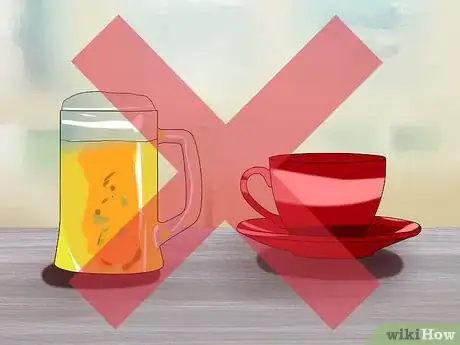

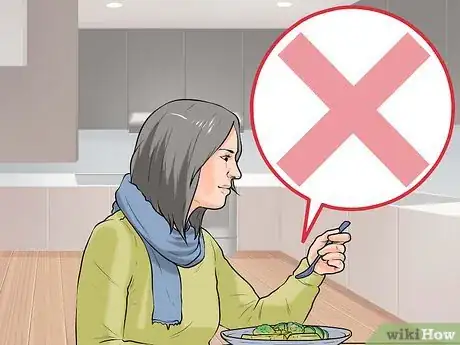



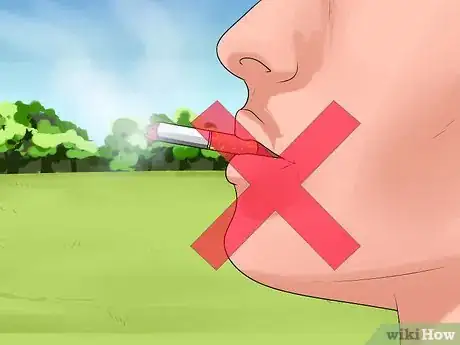


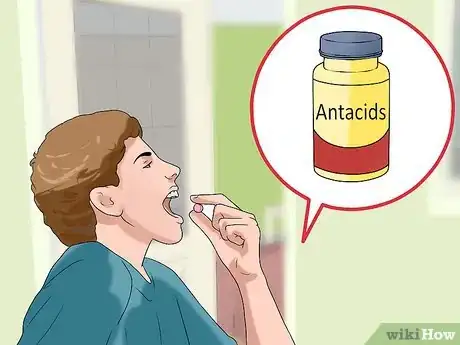
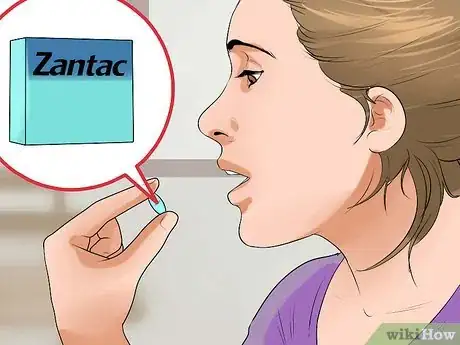
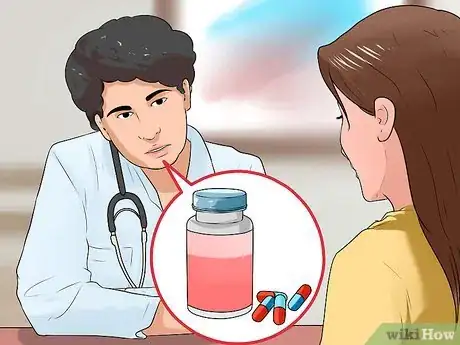
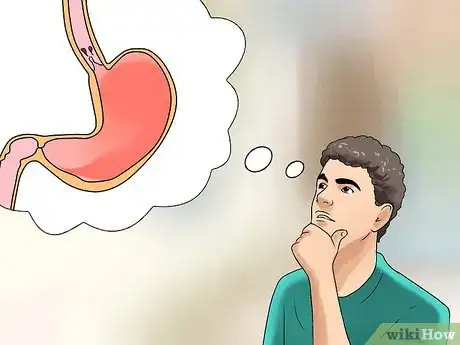
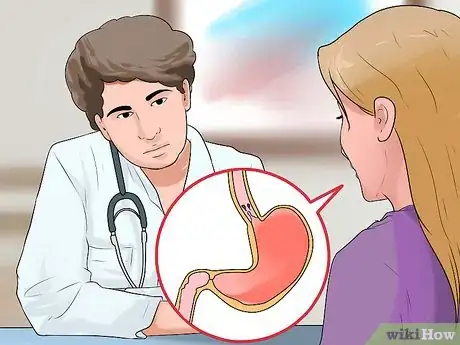
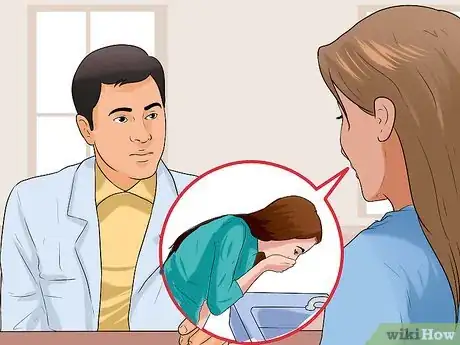


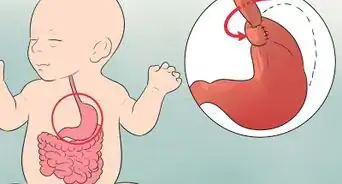

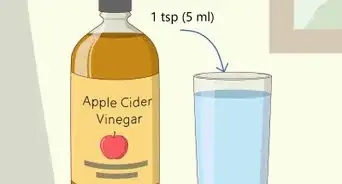


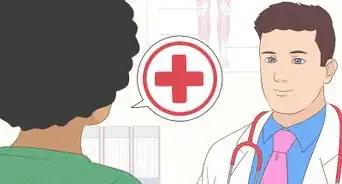












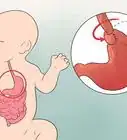




































Medical Disclaimer
The content of this article is not intended to be a substitute for professional medical advice, examination, diagnosis, or treatment. You should always contact your doctor or other qualified healthcare professional before starting, changing, or stopping any kind of health treatment.
Read More...